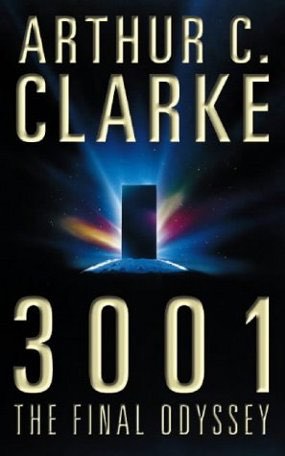Ridley Scott To Produce '2001: A Space Odyssey' Sequel '3001: The Final Odyssey'
We may receive a commission on purchases made from links.
Syfy has ordered a television miniseries adaptation of Arthur C. Clarke's novel 3001: The Final Odyssey. The 2001: A Space Odyssey sequel will be adapted by screenwriter Stuart Beattie of Pirates of the Caribbean and Collateral fame. Beattie will also serve as executive producer alongside Ridley Scott and David W. Zucker (Numbers, The Good Wife). More details on the 3001 The Final Odyssey miniseries, after the jump.
Arthur C. Clarke's 3001: The Final Odyssey was first published in 1997 (the paperback can be had for around $7 on amazon), the fourth and final book in Clarke's Space Odyssey series. 2010: Odyssey Two was developed into a 1984 film and 2061: Odyssey Three was published in 1987 which Tom Hanks had originally expressed interest in producing a film adaptation for MGM with himself cast in the role of Floyd, but it never happened. 3001 follows Frank Poole, the astronaut killed by the HAL-9000 computer in 2001: A Space Odyssey. The official book cover describes 3001: The Final Odyssey as follows:
One thousand years after the Jupiter mission to explore the mysterious Monolith had been destroyed, after Dave Bowman was transformed into the Star Child, Frank Poole drifted in space, frozen and forgotten, leaving the supercomputer HAL inoperable. But now Poole has returned to life, awakening in a world far different from the one he left behind–and just as the Monolith may be stirring once again....
Apparently Poole's freeze-dried body is "discovered in the Kuiper belt by a comet-collecting space tug named the Goliath, and revived." Poole returns to Earth in the year 3001, where things are very different:
Some of its notable features include the BrainCap, a brain-computer interface technology; genetically-engineered dinosaur servants; a space drive; and four gigantic space elevators located evenly around the Equator. Human beings have also colonised the Jovian moons Ganymede and Callisto. TMA-1, the black monolith found on the Moon in 1999, has been brought to Earth in 2006 and installed in front of the United Nations Building in New York City.
The story spans over 30 years. Sounds like some interesting ideas to explore and perfect for a longer medium like a miniseries. Scott gave a quote in the press release:
"I have always been a fan of Clarke's extraordinary Odyssey series, and certainly Kubrick's adaptation of 2001. I am thrilled to be part of bringing that legacy to audiences and continuing the great cinematic tradition that this story and its creators deserve."
Arthur C. Clarke's 3001: The Final Odyssey was a main selection of the Science Fiction Book Club and selected by the Literary Guild and Doubleday Book Club. The estates of both Clarke and 2001: A Space Odyssey director Stanley Kubrick are offering "their full support" for this mini series adaptation, but the extent of their involvement is not known at this time. The 3001 The Final Odyssey miniseries is aiming for 2015.

